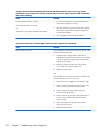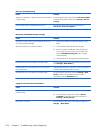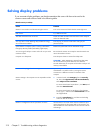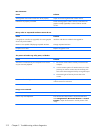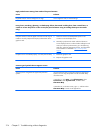
Solving display problems
If you encounter display problems, see the documentation that came with the monitor and to the
common causes and solutions listed in the following table.
Blank screen (no video).
Cause Solution
Monitor is not turned on and the monitor light is not on. Turn on the monitor and check that the monitor light is on.
Bad monitor. Try a different monitor.
The cable connections are not correct. Check the cable connection from the monitor to the computer
and to the electrical outlet.
You may have a screen blanking utility installed or energy
saver features are enabled.
Press any key or click the mouse button and type your
password (if set).
System ROM is corrupted; system is running in Boot Block
Emergency Recovery Mode (indicated by eight beeps).
Reflash the system ROM with the latest BIOS image.
You are using a fixed-sync monitor and it will not sync at the
resolution chosen.
Be sure that the monitor can accept the same horizontal scan
rate as the resolution chosen.
Computer is in Sleep state. Press the power button to resume from Sleep state.
CAUTION: When attempting to resume from Sleep state,
do not hold down the power button for more than four
seconds. Otherwise, the computer will shut down and you will
lose any unsaved data.
Monitor cable is plugged into the wrong connector. Systems may have a monitor connection on both the
motherboard or an add-in card. Try moving the monitor
connection to a different connector on the back of the
computer
Monitor settings in the computer are not compatible with the
monitor.
1. In Control Panel, select Category from the View by
list, then under Appearance and Personalization,
select Adjust screen resolution.
To access Control Panel in Windows 7, click Start, and
then select Control Panel.
To access Control Panel in Windows 8, from the Start
screen, type c, and then select Control Panel from the
list of applications.
2. Expand the Resolution box, and then use the sliding
control to reset the resolution.
Monitor is configured to use an input that is not active. Use the monitor's on-screen menu controls to select the input
that is being driven by the system. Refer to the monitor's user
documentation for more information on the on-screen controls
and settings.
210 Chapter 9 Troubleshooting without diagnostics



